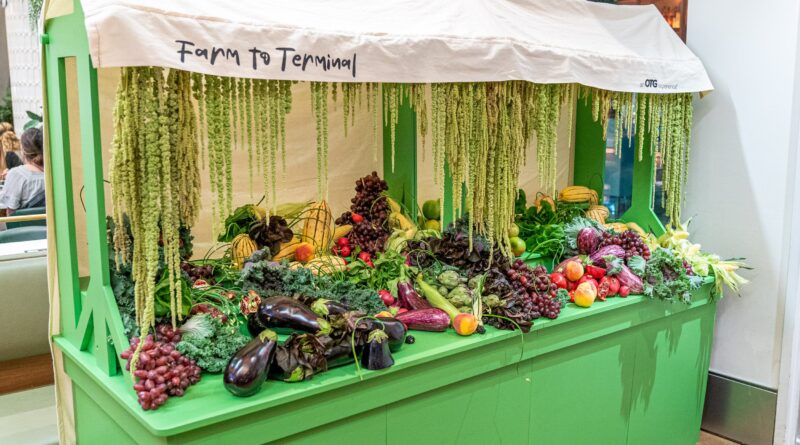Fine dining at the airport: An interview with OTG’s CEO – The Points Guy
It’s about 70 degrees in Pennington, New Jersey, a warm afternoon for October, as we trek from the tomato tunnel to a sprawling rice field. We’re on the Blue Moon Acres farm, about 50 miles southwest of Newark Liberty International Airport (EWR) and 75 miles from LaGuardia Airport (LGA).
As the sun shines down and the breeze carries hints of flowers, peppers and compost, air travel is the furthest thing from mind.
That’s not the case for the staff at Blue Moon Acres, including owner Jim Lyons, though. The farm is at the center of a transformation in American air travel that has seen airports become, unlikely as it sounds, nice.
The completion of yearslong infrastructure improvement programs has seen new airport terminals open across the country, bringing natural light, tall ceilings, user-friendly design and, crucially, restaurants you’d actually want to eat at. It’s worth getting to the airport an hour early just to enjoy a meal and a drink at one of these restaurants. (But remember, those drinks can add up, as commentator for The New York Times David Brooks recently found out.)
Want more aviation news? Sign up for TPG’s free biweekly Aviation newsletter.
The push to bring good, efficient dining past the security checkpoint has come from a few places, including New York-based OTG Management.
OTG, an airport concessionaire, first began to grow in Philadelphia in 1996, when founder Rick Blatstein, a local nightclub owner, acquired the rights to a concessionary stand at Philadelphia International Airport (PHL). Since then, it has spread to 10 airports across the U.S. as well as to Toronto Pearson International Airport (YYZ) in Canada.
This brings us back to the farm. One of the ways OTG has sought to elevate the preflight dining experience is by sourcing as many ingredients as possible locally. Blue Moon Acres is one of its suppliers for the New York region.
During an interview at LaGuardia following a farm tour, Blatstein — who has been the company’s CEO since founding it — said sourcing fresh and local ingredients wherever possible is a key part of OTG’s business model and efforts to actually appeal to travelers.

Daily Newsletter
Reward your inbox with the TPG Daily newsletter
Join over 700,000 readers for breaking news, in-depth guides and exclusive deals from TPG’s experts
“Our food has always been fresh food,” he said during the interview, which was conducted at an OTG restaurant in the newly built Delta Air Lines terminal, Terminal C. “We have the smallest freezers in the industry because everything is fresh.”
In developing restaurants, menus and overall concepts, OTG has had a rare opportunity in the New York area: the chance to design something from the ground up.
OTG worked hand-in-hand with United Airlines on the mid-2010s renovation of Newark’s Terminal C. The company built more than 55 bars and restaurants throughout the space, ranging from sandwich counters to steakhouses.
Part of the design process there, Blatstein said, was making use of the wide spaces in the various hallways and gate areas.
“We wanted to bring your eyes to what we’re doing,” he said. “So we took out the moving walkways and put restaurants right down the center [of the corridors].”
Blatstein cited the influence of European outdoor cafes, which he’d been fascinated by when watching James Bond movies.
“I used to love during the car chases, you’d see restaurants in the middle of the street. I thought that was the coolest thing in the world. So we put restaurants down the middle of the ‘street’ and people can walk right up to them.”
At Newark, OTG deployed two concepts that it would evolve for its future growth.
The first was a controversial one.
Screens, screens and more screens
When the new Terminal C opened, every single seat at each restaurant had an iPad bolted to the table in front of it.
The idea was simple and made sense: Travelers could find an empty seat, browse the menu, place their orders on the iPad screen and even swipe their credit cards to pay whenever they were ready.
It sped up service, saved time and let passengers stay at their tables until just before boarding — no need to worry about the check taking too long. There were still waiters to bring the food, answer questions and help with tech issues, too.
But the downside was that the iPads took up usable space on the tables, making it difficult for solo travelers to, say, have a laptop or a book open as they ate. For couples and groups, it could mean interrupted conversation every few moments as an order update pinged or an ad flashed across the screen.
Blatstein noted that his ideal solution would have been a smartphone app for travelers to use but that it was too cumbersome for most.
“Nobody’s going to download our app other than maybe some people who are very frequent travelers,” he said.
During the peak of the COVID-19 pandemic, OTG, like many travel brands, suffered.
“COVID happens, it pretty much puts us out of business,” Blatstein said. “We had to furlough 4,300 people in one day; it was one of the worst days of my life.”
As restaurants began to reopen and travel slowly began inching back, a tangential silver lining appeared, he said.
“People got very used to QR codes, and QR codes became like an instant app. So we built an entirely new platform and we made the bold decision to take the iPads out,” Blatstein said. “We took out over 23,000 iPads” spread across OTG’s airports in North America.
Even as COVID-19 shuttered the travel industry, it allowed airlines and airports to accelerate capital projects, taking advantage of virtually empty terminals and tarmacs.
The new LaGuardia was one of those projects that sped up during the slowdown, so to speak. Delta asked OTG to join in by finishing the restaurants in its terminal two years sooner than planned — a request with a major potential upside. However, it was a huge expense at a time when the concessionaire — and the airline — were bleeding money.
“We’re losing hundreds of millions of dollars, and now we’ve got to spend a zillion dollars faster than we anticipated,” Blatstein said. “But it ended up working out great.”
“Delta wanted to create something really special and unique,” Blatstein added. “And we had the opportunity to work with them on like, where to put certain things, choose locations, how to open them up, things like that. So it’s really turned out beautifully.”
This leads to the second concept that OTG brought from Newark’s Terminal C to LaGuardia’s: transformative restaurants.
From breakfast to dinner
The idea is to make the most of what is still a limited amount of space (despite the expansive renovation of the terminals).
While some of the terminal’s restaurants are built as single-purpose or traditional venues, some can be transformed in the middle of the day. That means that within the same space, the terminal can have extra breakfast venues in the morning — think bagel shops or cafes — while converting those spots to other restaurants for lunch or dinner.
At LaGuardia, that means visiting Eggy Weggy — a breakfast sandwich spot — and Poppy’s Bagels in the morning, giving way to Essex Burger and Chuko Ramen after 11 a.m. daily.
“Thirty percent of all air travel departs by 10 or 10:30 a.m.,” Blatstein said. “So breakfast is a big time. But who wants to see a place like ‘so-and-so ramen, and oh yeah, we have breakfast also.”
“Newark really worked out well with that; Newark’s been a great success,” he added.
Ultimately, Blatstein said, the goal is to create an entertaining and hospitable experience, just like in his past life running nightclubs.
“When someone comes through security until they board the plane, it’s our opportunity to deliver a great experience,” he said. “We get the baton passed to us from security, and we pass it to the airline when you get on the plane.”
For OTG, it’s been an opportunity to build something from scratch, replicate some of what’s worked well elsewhere and build a model that’s viable for expansion to other airports.
All made, of course, with tasty local ingredients.




